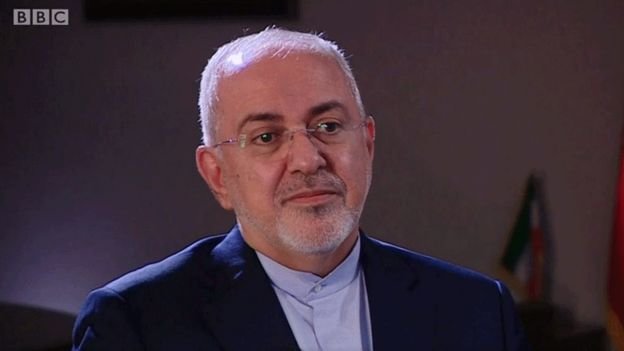Zarif assures Trump will not get a better deal

TEHRAN – Iranian Foreign Minister Mohammad Javad Zarif has said that he assures U.S. President Donald Trump that he will not get a better deal than the 2015 nuclear agreement, officially known as the Joint Comprehensive Plan of Action (JCPOA).
“We have a hundred and fifty pages document which is the deal and which was negotiated word by word not only by Iran and the United States but by six other powers. Having negotiated that deal and having been involved in this process for a very long time I can assure President Trump that the U.S. will not get a better deal,” he told BBC in an interview aired on Wednesday.
On a possible meeting between U.S. President Donald Trump and his Iranian counterpart Hassan Rouhani, Zarif said, “Nothing is impossible but the outcome of Mr. Trump summit with President Rouhani would be a ‘photo opportunity’ and a ‘two page document’.”
The chief diplomat added, “International relations is about respecting obligations. The United States negotiated a deal. What happened in the United States when President Trump came into office was not a revolution. It was simply a change of administration. And the nuclear deal is not a personal deal between myself and John Kerry or President Obama and President Rouhani. It is an international agreement between seven countries and the European Union which is included in a Security Council resolution.”
Commenting on European’s efforts to preserve the JCPOA after Washington’s withdrawal in May, he said that support from Europe to preserve the 2015 nuclear deal in the face of U.S. pressure “has been better than expected”.
“[British] Prime Minister May as well as [French] President Macron and almost anybody else said that we are committed and we are committed to see that Iran enjoys the economic dividends of the deal and the Europeans probably made better commitments than expected,” Zarif stated.
He added, “Then it was to translate those political commitments into mechanisms and I believe those mechanisms are going to be in place. The next task which is very important and difficult is to see if those mechanisms work. We are going to be a little bit more patient. It does not mean that our patience will never run out, but we are going to be a little bit more patient to see.”
Back in May, Trump withdrew his country from the 2015 nuclear deal between Tehran and world powers. Since then, the remaining parties to the deal, including France, Germany, the UK, Russia, and China, are trying to convince Tehran to remain in the multilateral agreement.
Under the agreement, Iran is obliged to put limits on its nuclear agreement in exchange for termination of economic and financial sanctions.
Twelve reports by the International Atomic Energy Agency have verified Iran’s compliance. The five other major powers to the deal—Britain, China, France, Germany, and Russia—have stuck by it.
To circumvent renewed U.S. sanctions, the European Union announced plans during the UN General Assembly week to create a new financial entity to facilitate transactions with Iran—a move that could also challenge U.S. domination of the international financial system. It will be open to “other partners in the world,” EU foreign policy chief Federica Mogherini said, after meeting Zarif.
She later noted the EU’s initiative to facilitate payment to/from Iran could be in place before November, when the U.S. is to re-impose the second batch of its anti-Iran sanctions.
While in New York for the UN summit last week, the Iranian president did not shut the door for a possible negotiations with the U.S. but he insisted that Washington must first cherish the nuclear agreement.
“I don’t believe there are any challenges in the world that can’t be resolved,” he told reporters. “There is no dead end. There is always a way forward.”
Rouhani said it would be easier for both countries to go back to where they were six months ago—when the diplomatic channel was open, before the U.S. abandoned the nuclear deal—than to go back six years.
Iran says will not talk with U.S. because it is not 'reliable'
In an interview with The New Yorker published on Monday, Foreign Minister Zarif said Iran will not sit for talks with the U.S. as long as it sees no reliability and realism on the other side.
“I’m not ruling out the prospect of talks provided the necessary conditions for talks, and that is reliability,” Zarif said in response to a question about the possibility of bilateral talks between Tehran and Washington.
“Reliability is different from trust. Reliability is that when you sign something you are bound by it,” the chief diplomat noted. He then cited an old Latin idiom, Pacta sunt servanda, which means “treaties shall be complied with”, and described it as the basis of international relations.
“Otherwise everything will fall apart… We are waiting for some sense of realism,” Zarif added.
Zarif further noted that the relationship between Iran and Washington needs to be based on some foundations, and the nuclear deal could be the one if the U.S. had remained in it.
NA/PA
Leave a Comment